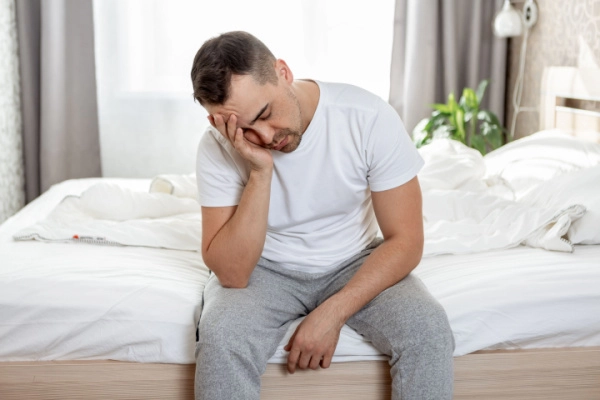
Cannabis Withdrawal: Symptoms and Treatment Options
Cannabis, more commonly known as marijuana, is one of the most commonly used drugs in the world. Views on cannabis use vary and are constantly evolving, leading to a complex situation where the drug is legal in many jurisdictions for both recreational and medicinal use and completely banned in others. However, cannabis withdrawal is a serious concern for users of the drug, whether they use it legally or illegally or for medical or recreational purposes.
Cannabis withdrawal is common among users with both regular and dependent use of cannabis. One study found that 47% of marijuana users experienced cannabis withdrawal. But what is cannabis withdrawal, and is there a cannabis withdrawal treatment? Read more to find out.
What Causes Cannabis Withdrawal?
Someone dependent on cannabis will experience a collection of unpleasant symptoms when they reduce or entirely eliminate their marijuana use. These symptoms are known as cannabis or marijuana withdrawal.
So, what causes marijuana withdrawal?
When a person heavily and/or chronically uses cannabis, their mind and body will become so accustomed to the presence of the drug that they will no longer be able to function “normally” without it. This is known as cannabis dependence.
“A sign of cannabis dependence is experiencing withdrawal symptoms like headaches and anxiety when you try to stop, along with needing more of the drug to feel the same effects,” says psychiatric mental health nurse practitioner (PMHNP) Valerie Puffenberger.
When you are dependent on cannabis and cut back on your use, withdrawal occurs as the body’s systems adjust to the lack of the drug and return to pre-marijuana functioning.
While a serious problem, cannabis dependence is different from a cannabis use disorder, better known as a cannabis addiction. To have a diagnosable cannabis use disorder, you must exhibit negative behaviors and actions that are caused by cannabis use or the desire to use. Examples might be missing work or neglecting familial obligations as a result of smoking marijuana.
Cannabis withdrawal and cannabis use disorder have a close relationship, in which one can be a causing factor in the other.
Those who experience cannabis withdrawal are more likely to consume larger quantities of the drug more frequently to avoid withdrawal and are, therefore, more likely to develop a use disorder. Similarly, those who have a use disorder are more likely to routinely use cannabis in large enough quantities to cause withdrawal.
Symptoms of Cannabis Withdrawal

Remember, every person is unique, and so is every case of cannabis withdrawal. No two people will experience the exact same cannabis withdrawal symptoms. Below, we’ll discuss some of the more common marijuana withdrawal symptoms to give you a general idea of what to expect.
What cannabis withdrawal symptoms appear and how long they last are determined by several factors, including:
- How long the patient has been using cannabis.
- How severe their cannabis dependence and/or addiction is.
- How frequently they use marijuana and in what quantities.
- The age, gender, weight, and overall health of the user.
- The presence of any co-occurring mental health conditions.
- The presence of any co-occurring addictions to other substances.
Some of the most common physical symptoms of cannabis withdrawal include:
- Headaches
- Nausea
- Vomiting
- Excessive sweating
- Insomnia
- Difficulty falling or staying asleep
- Loss of or increase in appetite
- Changes in sleep patterns
- Abdominal pain or discomfort
Common psychological symptoms of marijuana withdrawal include:
- Irritability
- Mood swings
- Anxiety
- Increased stress levels
- Depression
- Feelings of sadness
- Restlessness
- Difficulty staying calm
- Difficulty concentrating and/or focusing
- Vivid dreams
- Nightmares
- Changes in dream patterns
“Know that you have the inner resilience to push past this challenging yet temporary period of early sobriety,” says Puffenberger. “Withdrawal symptoms peak within the first week typically and subside from there – one day at a time. Each day is an achievement, so celebrate small wins.”
Cannabis Withdrawal Timeline
The duration of cannabis withdrawal symptoms varies from person to person. However, it is possible to construct a general timeline that aligns with what many cannabis withdrawal sufferers can expect.
The first cannabis withdrawal symptoms typically first appear within 24 to 48 hours after the last dose. The most symptoms are present — and most symptoms are at their most severe — within the first seven days after last use. This period is known as acute cannabis withdrawal. These symptoms gradually reduce in number and severity, and most are gone after 14 days after the last use.
In some cases, cannabis withdrawal symptoms, particularly psychological symptoms like irritability and sleep disturbances, persist for much longer, even as long as two years. These symptoms are known as post-acute withdrawal symptoms because they occur after the completion of acute withdrawal.
Cannabis Withdrawal Treatment Options
There are many different cannabis withdrawal treatments available, including medical treatments, behavioral therapies, and self-help strategies. Let’s take a closer look at each type of treatment.
Medical Treatments for Cannabis Withdrawal

There are no medications specifically approved for cannabis withdrawal, and, in general, medications are less frequently used in cannabis withdrawal treatment than for many other drugs. However, some medications are used for symptomatic relief or nutritional support.
Medications used to provide relief for cannabis withdrawal symptoms include:
- Over-the-counter pain relievers like Tylenol
- Over-the-counter headache medications like Advil
- Anti-anxiety medications like Xanax
- Medications used to treat co-occurring mental health disorders (e.g., Lexapro for depression)
- Medications used to treat co-occurring medical health problems (e.g., prescription pain relievers)
- Prescription sleep aids, like sleeping pills
Medical treatments used to provide nutritional support during cannabis withdrawal include:
- Consultation with a dietician
- Vitamins
- Proper hydration
- IVs
Behavioral Therapies for Cannabis Withdrawal

Behavioral therapies can be helpful in easing cannabis withdrawal symptoms. Some of the most effective include:
- Cognitive-behavioral therapy (CBT): CBT helps patients develop coping strategies and skills to help manage triggers, cravings, and stress.
- Motivational enhancement therapy (MET): MET increases motivation for change and improves commitment to sobriety by resolving any ambivalence the patient has about quitting.
- Contingency management: Contingency management provides tangible rewards as positive reinforcement for staying marijuana-free, thus promoting abstinence.
- Support groups: Participating in support groups such as Marijuana Anonymous (MA) provides participants with a sense of community and serves as a source of advice and shared experiences.
Self-Help Strategies for Cannabis Withdrawal

There are exercises you can perform on your own to help alleviate cannabis withdrawal symptoms. Puffenberger suggests the following self-help strategies to make cannabis withdrawal more manageable:
- Exercise, spend time outdoors, or engage in comforting hobbies. These naturally boost mood to counter symptoms like anxiety, depression and irritability. Consider taking up meditation, yoga or gentle swimming.
- Stay connected with supportive friends and family, reach out to join a cannabis support group meeting. Don’t isolate and quit quietly – having people to talk to makes a huge difference.
- Get plenty of rest, stay hydrated and maintain a nutritious diet. Withdrawal impacts sleep and eating habits significantly. Be gentle with your body, take hot baths or massage for muscle tension relief.
- Remove cannabis products/paraphernalia from your environment so they aren’t a source of temptation.
Seeking Help for Cannabis Withdrawal
Although cannabis withdrawal can be challenging for many to get through, you never have to go it alone.
Detox and Drug Rehab
Detox centers, especially those connected to a drug rehab center, are among the best places to go if you’re experiencing severe cannabis withdrawal symptoms. Here, medical professionals supervise patients, ensuring they are comfortable and safe during marijuana withdrawal.
Drug rehab centers often have programs designed specifically to treat marijuana use disorders that help patients achieve and maintain lasting sobriety. These facilities usually have programs that treat other co-occurring mental health and substance use disorders that may be fueling marijuana use.
Support Groups
Support groups provide many benefits to participants and can be a great resource if you’re struggling with cannabis withdrawal. These groups provide a sense of belonging and community, serve as a source of guidance, and drastically increase the chances that participants achieve and maintain sobriety.
Support groups, such as Marijuana Anonymous (MA) and Narcotics Anonymous (NA), are in most every community in the United States and in much of the world. Many groups even have online meetings.
Other Resources
There are many other recovery resources available to those seeking help for marijuana withdrawal. The Substance Abuse and Mental Health Services Administration (SAMHSA) provides a national helpline for individuals suffering from substance use disorders, along with many other resources.
Online forums and other online communities provide an immediate, 24-hour source of information and support. For example, you may be able to find a cannabis withdrawal support group on social media.
Finally, therapists and counselors are excellent resources for those seeking help with marijuana withdrawal, especially if you cannot attend drug rehab. There are several companies that provide virtual and affordable therapy sessions, so you can seek treatment that fits your schedule and budget.
Get Help Reducing Your Cannabis Use
The only way to permanently prevent cannabis withdrawal is to discontinue marijuana use. If you or a loved one is having trouble quitting marijuana on your own, you aren’t alone. Help is out there.
Legacy Healing Center is dedicated to helping our patients stop using marijuana so they can live a more vibrant and fulfilling life. We treat the mind, body, and spirit through clinical therapy, medication management, support groups, and aftercare programs to ensure a long-lasting recovery.
Call 888-534-2295 today to speak with a Legacy Healing staff member who can answer any questions you have about our marijuana addiction treatment programs.
Cannabis Withdrawal FAQs
What are the symptoms of cannabis withdrawal?
There are many possible symptoms of cannabis withdrawal, and which ones appear in each individual will vary. However, some of the most common and serious cannabis withdrawal symptoms include:
- Headaches
- Nausea and vomiting
- Sweating
- Insomnia and other sleep changes
- Appetite and weight changes
- Abdominal pain
- Irritability
- Anxiety
- Depression and sadness
- Impaired concentration and focus
- Vivid dreams and nightmares
Can cannabis help with alcohol withdrawal?
Some individuals may use cannabis to help with alcohol withdrawal, and some treatment programs and facilities may even use this technique. However, it is generally not advisable, and there is limited scientific evidence in its favor.
Alcohol withdrawal is one of the most dangerous forms of withdrawal and can be fatal. Those going through alcohol withdrawal, especially in cases of severe alcohol addiction, are always advised to do so only under medically supervised detox programs.
What is cannabis withdrawal psychosis?
Cannabis withdrawal psychosis refers to the development of psychotic symptoms during the cannabis withdrawal process. These symptoms may include hallucinations, delusions, and impaired ability to perceive reality. It is always advisable to contact a medical professional to seek help whenever psychotic symptoms appear, including in cases of cannabis withdrawal psychosis Cannabis, more commonly known as marijuana, is one of the most commonly used drugs in the world. Views on cannabis use vary and are constantly evolving, leading to a complex situation where the drug is legal in many jurisdictions for both recreational and medicinal use and completely banned in others. However, cannabis withdrawal is a serious concern for users of the drug, whether they use it legally or illegally or for medical or recreational purposes.
Cannabis withdrawal is common among users with both regular and dependent use of cannabis. One study found that 47% of marijuana users experienced cannabis withdrawal. But what is cannabis withdrawal, and is there a cannabis withdrawal treatment? Read more to find out.
What Causes Cannabis Withdrawal?
Someone dependent on cannabis will experience a collection of unpleasant symptoms when they reduce or entirely eliminate their marijuana use. These symptoms are known as cannabis or marijuana withdrawal.
So, what causes marijuana withdrawal?
When a person heavily and/or chronically uses cannabis, their mind and body will become so accustomed to the presence of the drug that they will no longer be able to function “normally” without it. This is known as cannabis dependence.
“A sign of cannabis dependence is experiencing withdrawal symptoms like headaches and anxiety when you try to stop, along with needing more of the drug to feel the same effects,” says psychiatric mental health nurse practitioner (PMHNP) Valerie Puffenberger.
When you are dependent on cannabis and cut back on your use, withdrawal occurs as the body’s systems adjust to the lack of the drug and return to pre-marijuana functioning.
While a serious problem, cannabis dependence is different from a cannabis use disorder, better known as a cannabis addiction. To have a diagnosable cannabis use disorder, you must exhibit negative behaviors and actions that are caused by cannabis use or the desire to use. Examples might be missing work or neglecting familial obligations as a result of smoking marijuana.
Cannabis withdrawal and cannabis use disorder have a close relationship, in which one can be a causing factor in the other.
Those who experience cannabis withdrawal are more likely to consume larger quantities of the drug more frequently to avoid withdrawal and are, therefore, more likely to develop a use disorder. Similarly, those who have a use disorder are more likely to routinely use cannabis in large enough quantities to cause withdrawal.
Symptoms of Cannabis Withdrawal

Remember, every person is unique, and so is every case of cannabis withdrawal. No two people will experience the exact same cannabis withdrawal symptoms. Below, we’ll discuss some of the more common marijuana withdrawal symptoms to give you a general idea of what to expect.
What cannabis withdrawal symptoms appear and how long they last are determined by several factors, including:
- How long the patient has been using cannabis.
- How severe their cannabis dependence and/or addiction is.
- How frequently they use marijuana and in what quantities.
- The age, gender, weight, and overall health of the user.
- The presence of any co-occurring mental health conditions.
- The presence of any co-occurring addictions to other substances.
Some of the most common physical symptoms of cannabis withdrawal include:
- Headaches
- Nausea
- Vomiting
- Excessive sweating
- Insomnia
- Difficulty falling or staying asleep
- Loss of or increase in appetite
- Changes in sleep patterns
- Abdominal pain or discomfort
Common psychological symptoms of marijuana withdrawal include:
- Irritability
- Mood swings
- Anxiety
- Increased stress levels
- Depression
- Feelings of sadness
- Restlessness
- Difficulty staying calm
- Difficulty concentrating and/or focusing
- Vivid dreams
- Nightmares
- Changes in dream patterns
“Know that you have the inner resilience to push past this challenging yet temporary period of early sobriety,” says Puffenberger. “Withdrawal symptoms peak within the first week typically and subside from there – one day at a time. Each day is an achievement, so celebrate small wins.”
Cannabis Withdrawal Timeline
The duration of cannabis withdrawal symptoms varies from person to person. However, it is possible to construct a general timeline that aligns with what many cannabis withdrawal sufferers can expect.
The first cannabis withdrawal symptoms typically first appear within 24 to 48 hours after the last dose. The most symptoms are present — and most symptoms are at their most severe — within the first seven days after last use. This period is known as acute cannabis withdrawal. These symptoms gradually reduce in number and severity, and most are gone after 14 days after the last use.
In some cases, cannabis withdrawal symptoms, particularly psychological symptoms like irritability and sleep disturbances, persist for much longer, even as long as two years. These symptoms are known as post-acute withdrawal symptoms because they occur after the completion of acute withdrawal.
Cannabis Withdrawal Treatment Options
There are many different cannabis withdrawal treatments available, including medical treatments, behavioral therapies, and self-help strategies. Let’s take a closer look at each type of treatment.
Medical Treatments for Cannabis Withdrawal

There are no medications specifically approved for cannabis withdrawal, and, in general, medications are less frequently used in cannabis withdrawal treatment than for many other drugs. However, some medications are used for symptomatic relief or nutritional support.
Medications used to provide relief for cannabis withdrawal symptoms include:
- Over-the-counter pain relievers like Tylenol
- Over-the-counter headache medications like Advil
- Anti-anxiety medications like Xanax
- Medications used to treat co-occurring mental health disorders (e.g., Lexapro for depression)
- Medications used to treat co-occurring medical health problems (e.g., prescription pain relievers)
- Prescription sleep aids, like sleeping pills
Medical treatments used to provide nutritional support during cannabis withdrawal include:
- Consultation with a dietician
- Vitamins
- Proper hydration
- IVs
Behavioral Therapies for Cannabis Withdrawal

Behavioral therapies can be helpful in easing cannabis withdrawal symptoms. Some of the most effective include:
- Cognitive-behavioral therapy (CBT): CBT helps patients develop coping strategies and skills to help manage triggers, cravings, and stress.
- Motivational enhancement therapy (MET): MET increases motivation for change and improves commitment to sobriety by resolving any ambivalence the patient has about quitting.
- Contingency management: Contingency management provides tangible rewards as positive reinforcement for staying marijuana-free, thus promoting abstinence.
- Support groups: Participating in support groups such as Marijuana Anonymous (MA) provides participants with a sense of community and serves as a source of advice and shared experiences.
Self-Help Strategies for Cannabis Withdrawal

There are exercises you can perform on your own to help alleviate cannabis withdrawal symptoms. Puffenberger suggests the following self-help strategies to make cannabis withdrawal more manageable:
- Exercise, spend time outdoors, or engage in comforting hobbies. These naturally boost mood to counter symptoms like anxiety, depression and irritability. Consider taking up meditation, yoga or gentle swimming.
- Stay connected with supportive friends and family, reach out to join a cannabis support group meeting. Don’t isolate and quit quietly – having people to talk to makes a huge difference.
- Get plenty of rest, stay hydrated and maintain a nutritious diet. Withdrawal impacts sleep and eating habits significantly. Be gentle with your body, take hot baths or massage for muscle tension relief.
- Remove cannabis products/paraphernalia from your environment so they aren’t a source of temptation.
Seeking Help for Cannabis Withdrawal
Although cannabis withdrawal can be challenging for many to get through, you never have to go it alone.
Detox and Drug Rehab
Detox centers, especially those connected to a drug rehab center, are among the best places to go if you’re experiencing severe cannabis withdrawal symptoms. Here, medical professionals supervise patients, ensuring they are comfortable and safe during marijuana withdrawal.
Drug rehab centers often have programs designed specifically to treat marijuana use disorders that help patients achieve and maintain lasting sobriety. These facilities usually have programs that treat other co-occurring mental health and substance use disorders that may be fueling marijuana use.
Support Groups
Support groups provide many benefits to participants and can be a great resource if you’re struggling with cannabis withdrawal. These groups provide a sense of belonging and community, serve as a source of guidance, and drastically increase the chances that participants achieve and maintain sobriety.
Support groups, such as Marijuana Anonymous (MA) and Narcotics Anonymous (NA), are in most every community in the United States and in much of the world. Many groups even have online meetings.
Other Resources
There are many other recovery resources available to those seeking help for marijuana withdrawal. The Substance Abuse and Mental Health Services Administration (SAMHSA) provides a national helpline for individuals suffering from substance use disorders, along with many other resources.
Online forums and other online communities provide an immediate, 24-hour source of information and support. For example, you may be able to find a cannabis withdrawal support group on social media.
Finally, therapists and counselors are excellent resources for those seeking help with marijuana withdrawal, especially if you cannot attend drug rehab. There are several companies that provide virtual and affordable therapy sessions, so you can seek treatment that fits your schedule and budget.
Get Help Reducing Your Cannabis Use
The only way to permanently prevent cannabis withdrawal is to discontinue marijuana use. If you or a loved one is having trouble quitting marijuana on your own, you aren’t alone. Help is out there.
Legacy Healing Center is dedicated to helping our patients stop using marijuana so they can live a more vibrant and fulfilling life. We treat the mind, body, and spirit through clinical therapy, medication management, support groups, and aftercare programs to ensure a long-lasting recovery.
Call 888-534-2295 today to speak with a Legacy Healing staff member who can answer any questions you have about our marijuana addiction treatment programs.
Cannabis Withdrawal FAQs
What are the symptoms of cannabis withdrawal?
There are many possible symptoms of cannabis withdrawal, and which ones appear in each individual will vary. However, some of the most common and serious cannabis withdrawal symptoms include:
- Headaches
- Nausea and vomiting
- Sweating
- Insomnia and other sleep changes
- Appetite and weight changes
- Abdominal pain
- Irritability
- Anxiety
- Depression and sadness
- Impaired concentration and focus
- Vivid dreams and nightmares
Can cannabis help with alcohol withdrawal?
Some individuals may use cannabis to help with alcohol withdrawal, and some treatment programs and facilities may even use this technique. However, it is generally not advisable, and there is limited scientific evidence in its favor.
Alcohol withdrawal is one of the most dangerous forms of withdrawal and can be fatal. Those going through alcohol withdrawal, especially in cases of severe alcohol addiction, are always advised to do so only under medically supervised detox programs.
What is cannabis withdrawal psychosis?
Cannabis withdrawal psychosis refers to the development of psychotic symptoms during the cannabis withdrawal process. These symptoms may include hallucinations, delusions, and impaired ability to perceive reality. It is always advisable to contact a medical professional to seek help whenever psychotic symptoms appear, including in cases of cannabis withdraw.
Sources
- National Library of Medicine. (2020). Prevalence of Cannabis Withdrawal Symptoms Among People with Regular or Dependent Use of Cannabinoids.
- National Library of Medicine. (2022). Clinical Management of Cannabis Withdrawal.
- Journal of the American Medical Association (JAMA) Network. (2020). Prevalence of Cannabis Withdrawal Symptoms Among People with Regular or Dependent Use of Cannabinoids – A Systemic Review and Meta-Analysis.
- Harvard Health Publishing. (2020). If Cannabis Becomes a Problem: How to Manage Withdrawal.
- National Institute on Drug Abuse. (n.d.). Home Page.
- Substance Abuse and Mental Health Services Administration. (n.d.). Home Page.






 Verify Insurance
Verify Insurance